Athenry is one of the most iconic locations in Ireland, made famous by the Irish folk ballad, The Fields of Athenry. It is among these famous Galway plains that you will find a farm with a manufacturing studio – a place where luxurious, handmade leather items are made and have gone to places near and far.
Mishnóc is the name of the business and Pat Delany is the man behind it. The brand manufactures its own leather goods in Athenry, as well as importing leather products from around the world, both of which are sold in their shop in Galway city.
The farm has been passed down through Pat’s family and many changes have occurred in those years. Like his grandfather, Pat had to adapt to changing times.
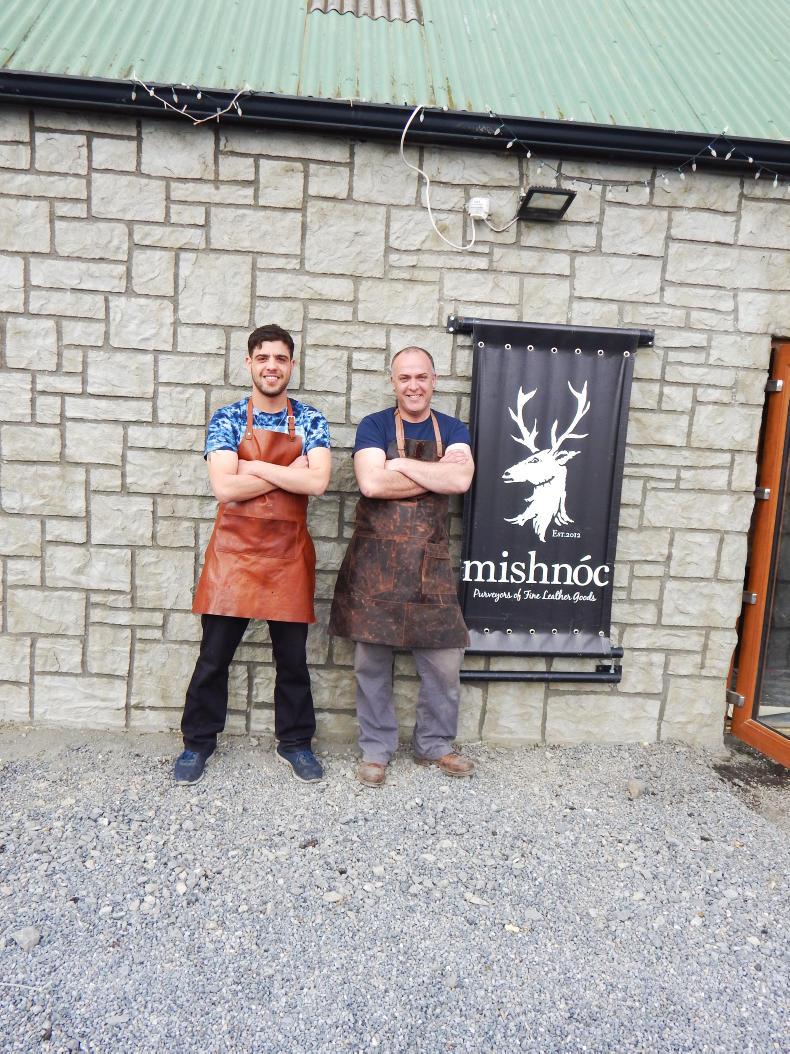
Pat Delaney and Rodrigo Marques pictured outside the workshop in Athenry.
“My grandfather was a progressive-thinking man. He had the first car in this parish and everyone used to come to him to get a lift to the hospital,” says Pat.
“My grandfather left the farm to my father and then he left it to me, so off I went sheep farming. We have had three or four generations of sheep farmers and I would have taken [farming] very seriously for about two years, but I quickly realised that it’s a very difficult living, especially with 35ac.

Mishnóc workshop in Athenry.
“Now I rent 29ac to a local dairy farmer and I keep 10 breeding ewes on the six acres. The workshop and having the sheep – it’s a lifestyle choice. I’m a firm believer that work should be as enjoyable as you can make it. The world is a topsy-turvy place and there is a lot of uncertainty in any job. Farming grounds me and if it all goes to pot, I have 35ac of land and a few sheep; that gives me comfort in life.”
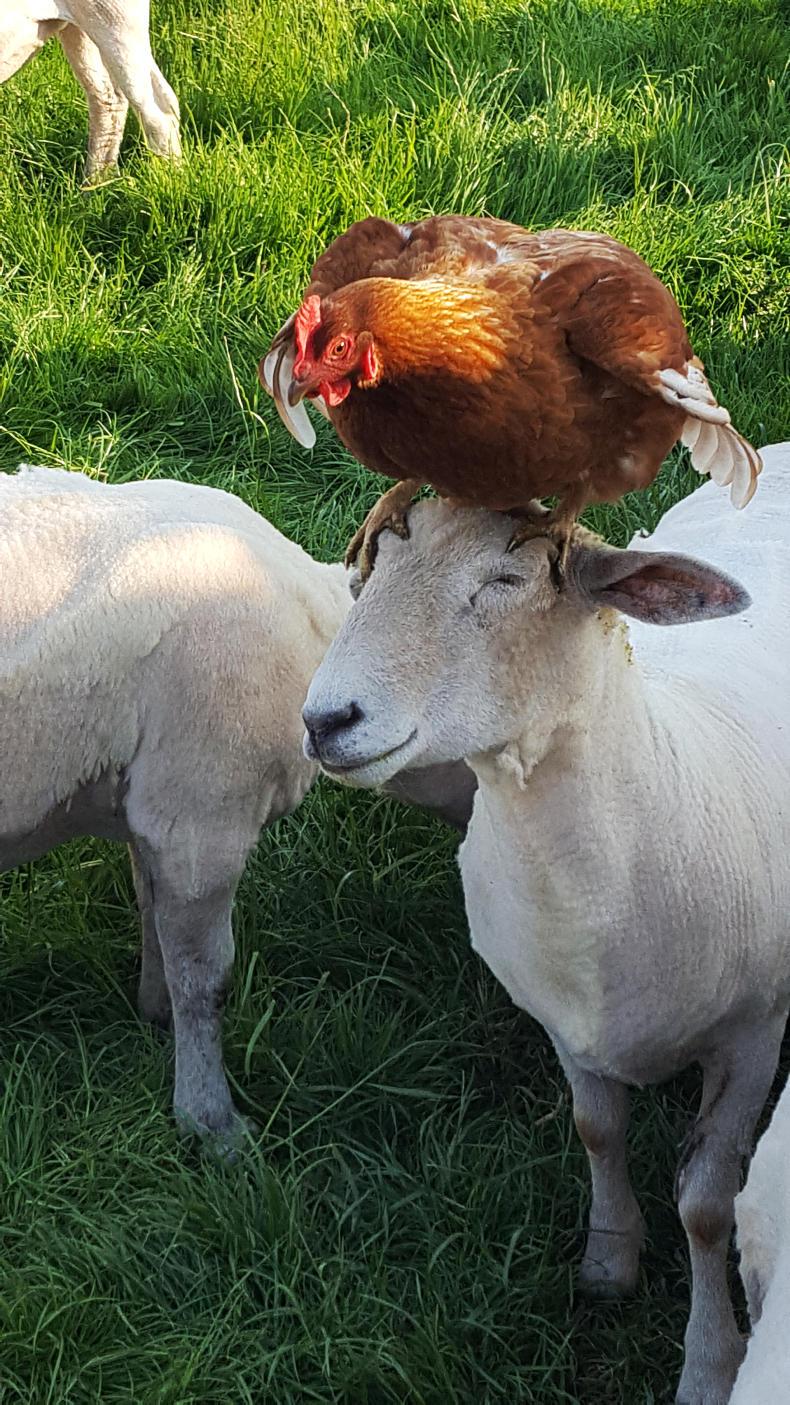
Pat's sheep pictured at his farm.
Mishnóc
In 2010, Pat started to sell handmade leather goods at the markets, where he met his business partner, Mark McDonnell.
“Mark has been there since the beginning; he is the face of retail. We met on the market. Mark didn’t drive and I had a van so I said, ‘Look if you need a lift, we might as well go together’.
“Rodrigo Marques has been with us for a year and a half and he is an artist.He takes direction from me, but he is a true artist in terms of leather craft. If it gets made, it went through his hands.”
After a year on the market, Mishnóc moved into retail and Galway provides an ideal location.
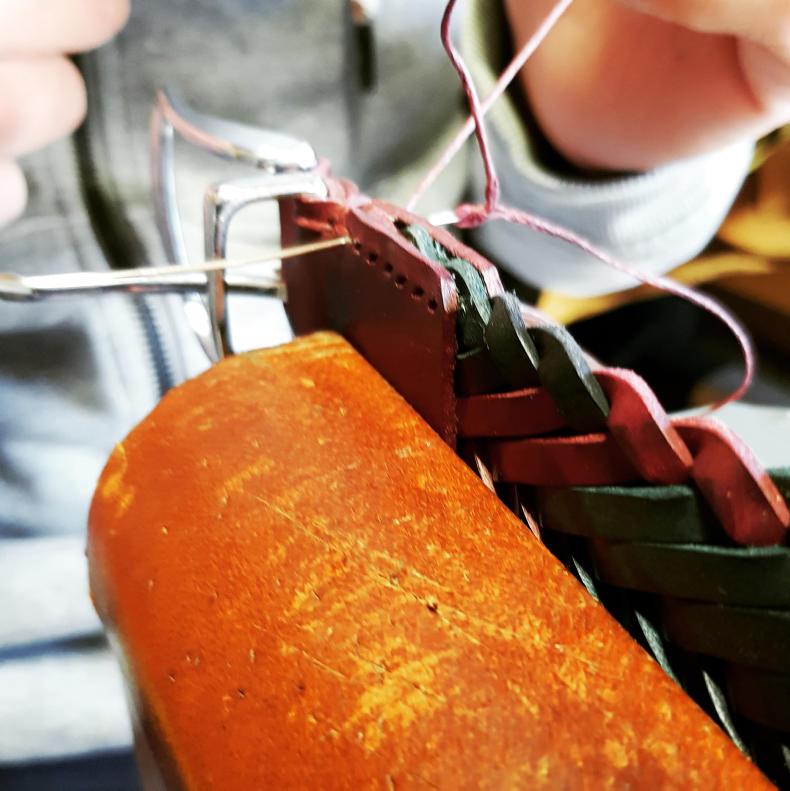
Hand-stitching a Mishnóc belt.
“We do a premium product, and if it has to be €400, it has to be €400. It isn’t everyone’s cup of tea, but the city gives us the customer that likes what we do.
“The high street is still brilliant for meeting the American and Asian market. Facebook is brilliant for dealing with the local market and people who are visiting Galway. They will interact with you online and then if they pass the shop, they’ll go, ‘That’s Mishnóc, we’ll go in for a look’.
“We have a very cool thing in the shop. I don’t know when I’m going to sell it, but it is two sheep skins, it’s a mad big fur coat. Someday someone from Boston will come in and go, ‘Give it to me!’ We also make waistcoats, really cool handmade belts, notebooks and stuff like that.”
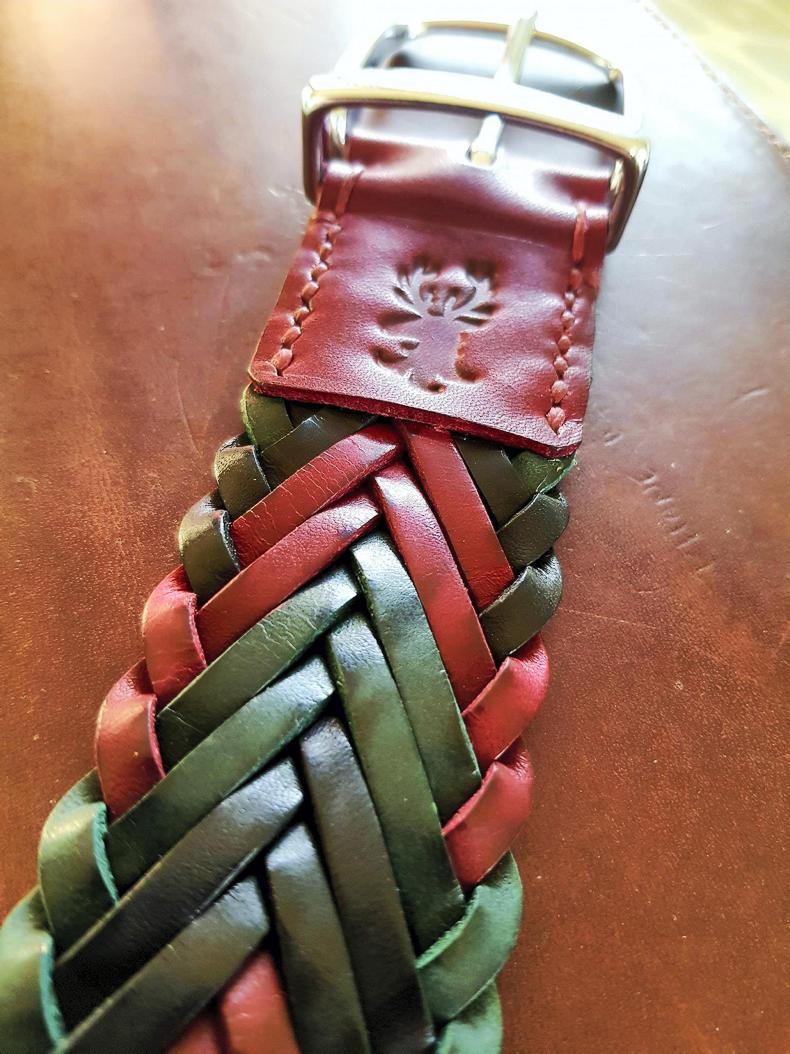
Mishnóc handwoven belt €149. Belts start from €40.
Twisting traditional methods with a contemporary design is at the core of Mishnóc’s goods.
“Every bag has to be prototyped. It starts with an idea and then there are a million variations of leather available. Each leather has a temper; that is the way that it folds, hangs and sits. A new bag will probably be made 15 times before it’s finished. We prototype, we make, we wear and then we do it again. It’s a long process because I’m very design-led and if it looks like a pig, it’s a pig,” laughs Pat.
“It must be perfect and that comes down to the craft and the leather. We’re very ambitious, in that we want to make the best leather goods that we can, but leather goods on their own are not enough; they must contain a design element. What we do is traditional, but our design element, we hope, is contemporary.
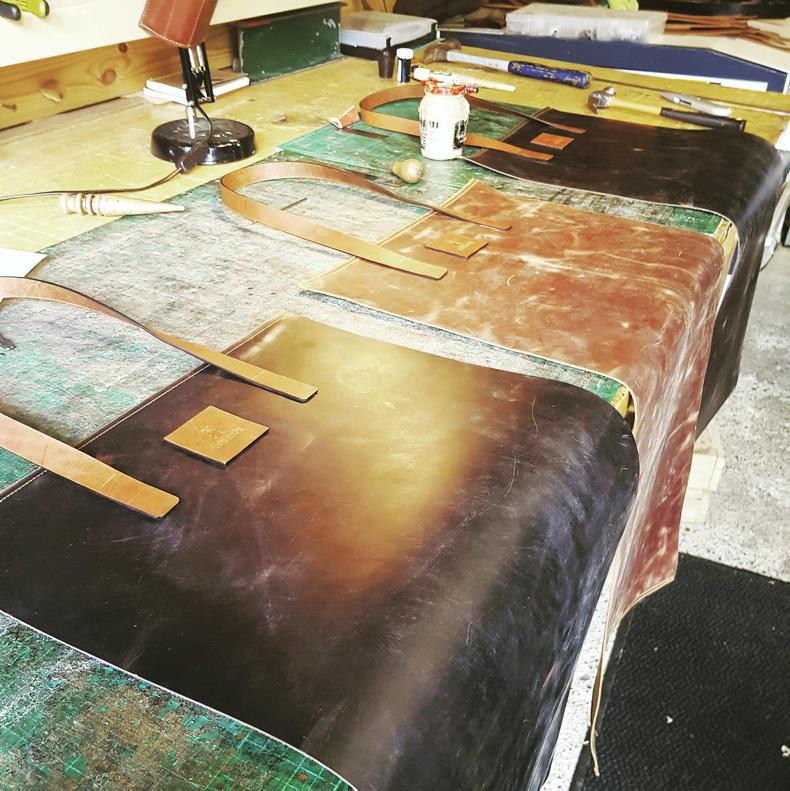
Mishnóc Saoirse bags being made.
“Our Gráinne bag has gone to at least 70 countries. This has never happened but one day it will; I’ll be in New York and I’ll see someone with our Mishnóc bag that was made in a farm yard in the west of Ireland.”
Heritage
Working in the leather industry has kept Pat close to his farming heritage.
“For me, making leather goods is an extension of my heritage and when I’m buying leather, it’s interesting to see the journey that leather has from farm to tannery; it would be similar to the ‘farm to fork’ idea.
“The thing that has stuck with me since I was 12 or 13 is shearing sheep. My grandfather would have insisted that all sheep are dagged (cleaning the sheep’s buttocks before shearing) to keep the fleece clean. Then you hand roll every fleece and you couldn’t mess with the wool; it had to be perfect.
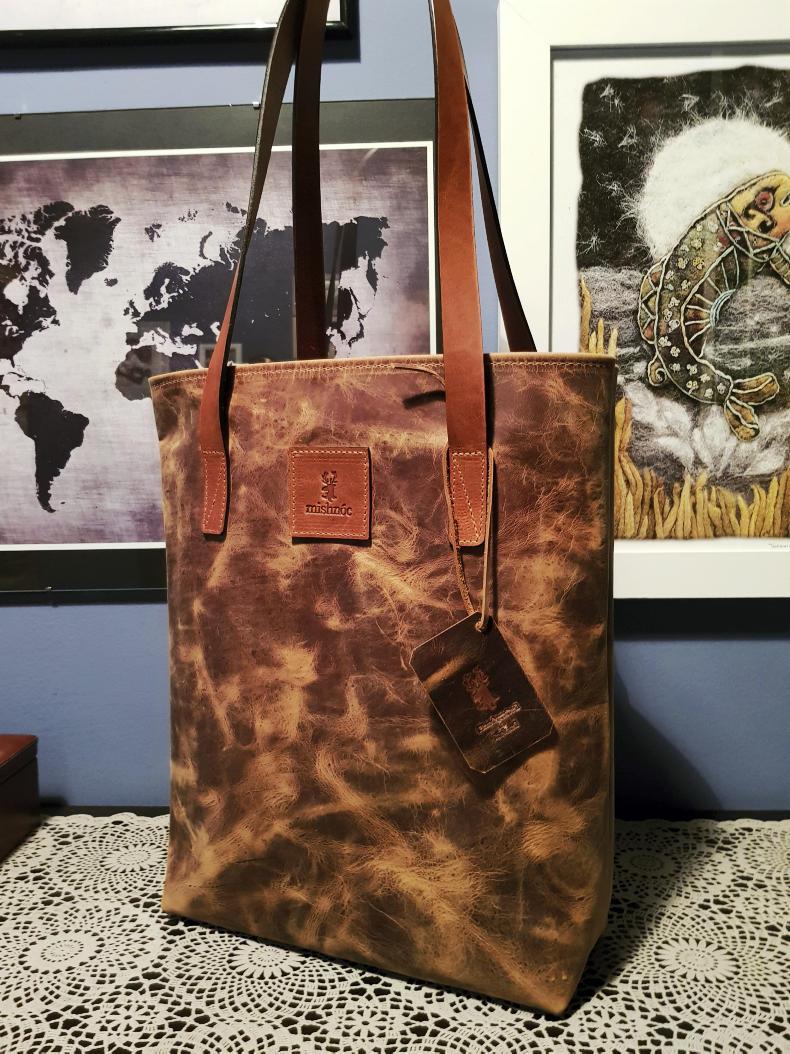
Mishnóc Saoirse tote bag €185.
“As I got older, I could see that it was being prepared for the guy who washes the wool, and he was preparing it for the person who would weave the wool. Nowadays you don’t dag the sheep and you just chuck the wool in the bag.
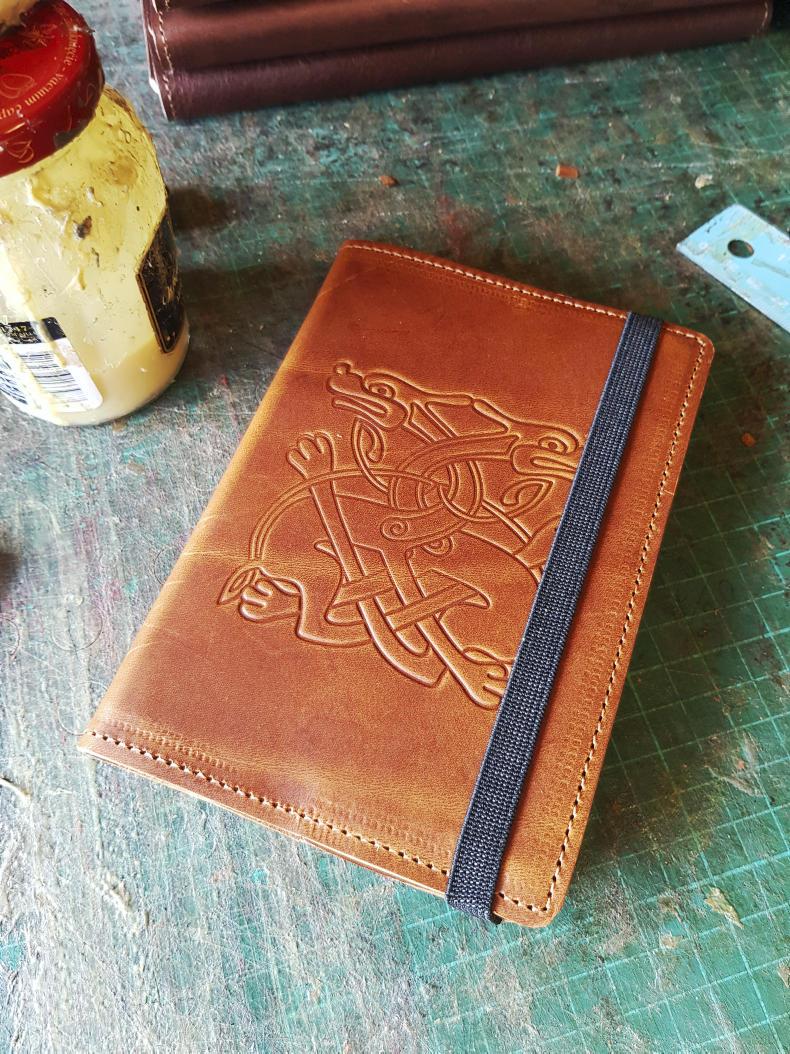
Mishnóc notebook cover €40.
“I miss that lifestyle, where everything was very deliberate. You got paid for your product, and everything was very high quality, from farm to the finished product. Now we tend to be driven by productivity. Years ago, everything had to be quality or else you didn’t get paid.”
Milan
Milan Fashion Week has enabled Pat to mingle with the best in the business.
“Every September we go to Milan Fashion Week. The leather fairs in Milan run the same week, so I’m literally buying leather with your man from Dolce and Gabbana sitting across from me buying the same. I mean a sheep farmer from the west of Ireland- it’s very cool,” says Pat.

Mishnóc brand.
“I love the fact that we’re out there with the best, we’re bringing the best leather in the world home and hopefully we’re doing something decent with it.”
Animal Welfare
As a farmer, animal welfare always comes first for Mishnóc.
“I’m an animal lover and we would never deal in any leather that would be farmed for its skin.
“We primarily use cow leather, which is a byproduct of the meat industry, so I can’t eat burgers and then have a problem with making leather goods.
“I honour the animal until the last piece and that’s the leather hide. If we don’t have a market for that, it gets dumped and that’s not good.”
Rural Ireland
Working and living in Athenry, Pat would like to see more being done to help rural Ireland thrive.
“I’m big on rural Ireland and it’s in a real decline at the minute. The Government have let down rural people in terms of businesses like mine and people who want to open similar businesses. Politicians have let rural people and farmers down.
“I run the internet business from home, I have a leather workshop, I employ people including two students and we don’t have a post office.

Mishnóc Gráinne Tote bag €299.
“What they could do for businesses is relax with planning. We lost Apple in Athenry, a trillion-dollar company in this little rural parish, because the planning laws were so restrictive.
“When I want to expand and employ more people, will they give me planning permission in the countryside? I guarantee they would send me to Galway.
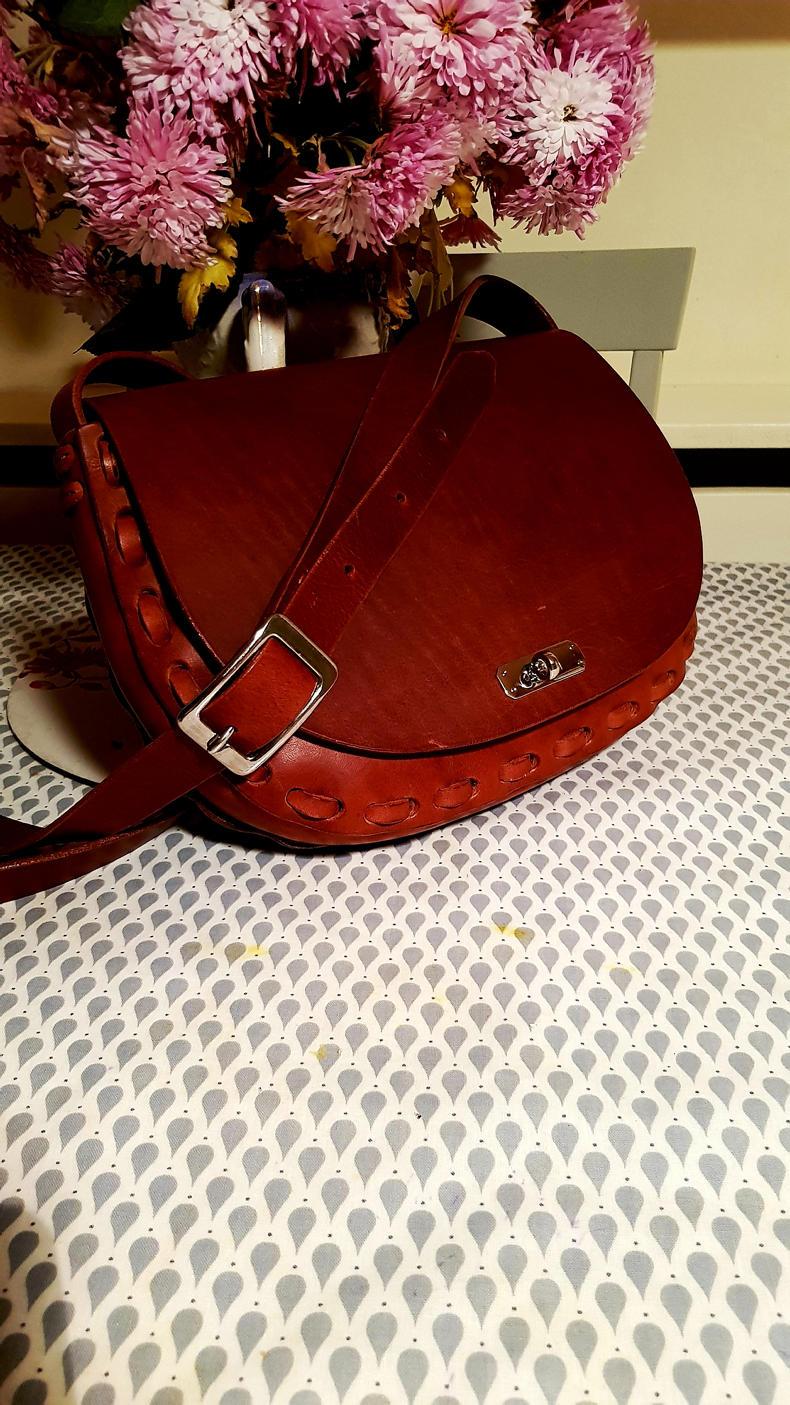
Mishnóc Roisin bag €299.
“I live in a rural area, and I know I bring comfort to elderly neighbours who know that I am here. Other than that every house is closed up and they have gone to work in Galway. Rural Ireland is not dying, it’s being destroyed.”
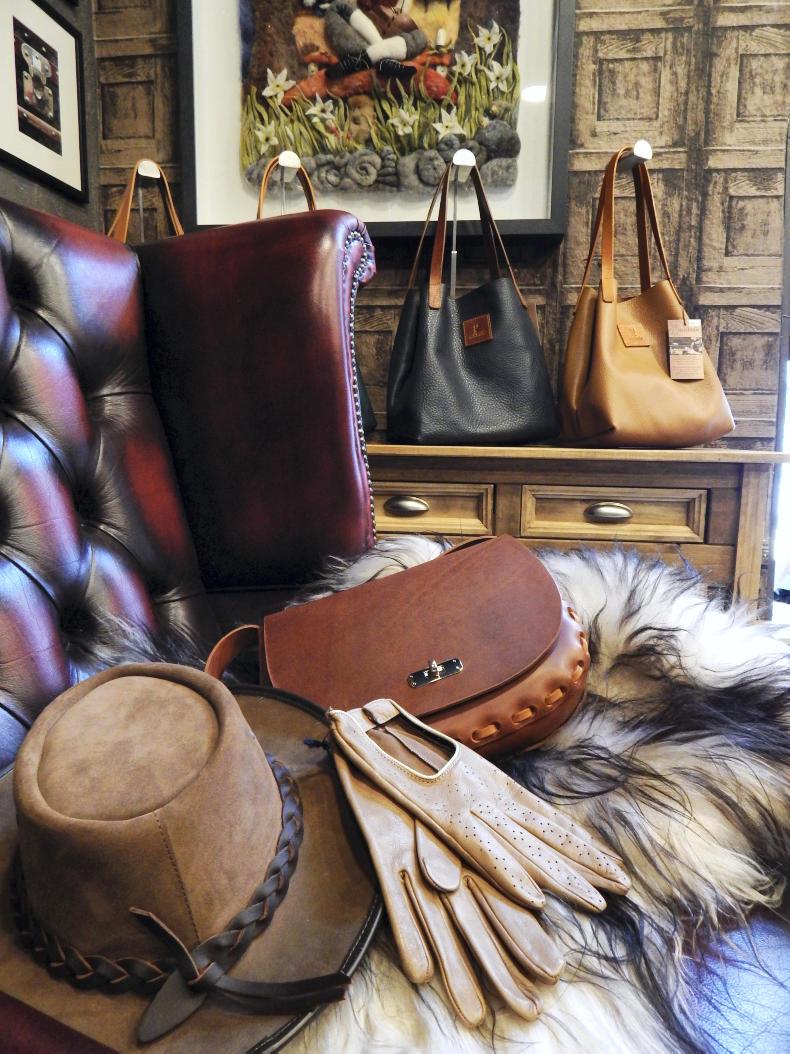
Mishnóc shop pictured, featured bag Roisin €299.
Athenry is one of the most iconic locations in Ireland, made famous by the Irish folk ballad, The Fields of Athenry. It is among these famous Galway plains that you will find a farm with a manufacturing studio – a place where luxurious, handmade leather items are made and have gone to places near and far.
Mishnóc is the name of the business and Pat Delany is the man behind it. The brand manufactures its own leather goods in Athenry, as well as importing leather products from around the world, both of which are sold in their shop in Galway city.
The farm has been passed down through Pat’s family and many changes have occurred in those years. Like his grandfather, Pat had to adapt to changing times.

Pat Delaney and Rodrigo Marques pictured outside the workshop in Athenry.
“My grandfather was a progressive-thinking man. He had the first car in this parish and everyone used to come to him to get a lift to the hospital,” says Pat.
“My grandfather left the farm to my father and then he left it to me, so off I went sheep farming. We have had three or four generations of sheep farmers and I would have taken [farming] very seriously for about two years, but I quickly realised that it’s a very difficult living, especially with 35ac.

Mishnóc workshop in Athenry.
“Now I rent 29ac to a local dairy farmer and I keep 10 breeding ewes on the six acres. The workshop and having the sheep – it’s a lifestyle choice. I’m a firm believer that work should be as enjoyable as you can make it. The world is a topsy-turvy place and there is a lot of uncertainty in any job. Farming grounds me and if it all goes to pot, I have 35ac of land and a few sheep; that gives me comfort in life.”

Pat's sheep pictured at his farm.
Mishnóc
In 2010, Pat started to sell handmade leather goods at the markets, where he met his business partner, Mark McDonnell.
“Mark has been there since the beginning; he is the face of retail. We met on the market. Mark didn’t drive and I had a van so I said, ‘Look if you need a lift, we might as well go together’.
“Rodrigo Marques has been with us for a year and a half and he is an artist.He takes direction from me, but he is a true artist in terms of leather craft. If it gets made, it went through his hands.”
After a year on the market, Mishnóc moved into retail and Galway provides an ideal location.

Hand-stitching a Mishnóc belt.
“We do a premium product, and if it has to be €400, it has to be €400. It isn’t everyone’s cup of tea, but the city gives us the customer that likes what we do.
“The high street is still brilliant for meeting the American and Asian market. Facebook is brilliant for dealing with the local market and people who are visiting Galway. They will interact with you online and then if they pass the shop, they’ll go, ‘That’s Mishnóc, we’ll go in for a look’.
“We have a very cool thing in the shop. I don’t know when I’m going to sell it, but it is two sheep skins, it’s a mad big fur coat. Someday someone from Boston will come in and go, ‘Give it to me!’ We also make waistcoats, really cool handmade belts, notebooks and stuff like that.”

Mishnóc handwoven belt €149. Belts start from €40.
Twisting traditional methods with a contemporary design is at the core of Mishnóc’s goods.
“Every bag has to be prototyped. It starts with an idea and then there are a million variations of leather available. Each leather has a temper; that is the way that it folds, hangs and sits. A new bag will probably be made 15 times before it’s finished. We prototype, we make, we wear and then we do it again. It’s a long process because I’m very design-led and if it looks like a pig, it’s a pig,” laughs Pat.
“It must be perfect and that comes down to the craft and the leather. We’re very ambitious, in that we want to make the best leather goods that we can, but leather goods on their own are not enough; they must contain a design element. What we do is traditional, but our design element, we hope, is contemporary.

Mishnóc Saoirse bags being made.
“Our Gráinne bag has gone to at least 70 countries. This has never happened but one day it will; I’ll be in New York and I’ll see someone with our Mishnóc bag that was made in a farm yard in the west of Ireland.”
Heritage
Working in the leather industry has kept Pat close to his farming heritage.
“For me, making leather goods is an extension of my heritage and when I’m buying leather, it’s interesting to see the journey that leather has from farm to tannery; it would be similar to the ‘farm to fork’ idea.
“The thing that has stuck with me since I was 12 or 13 is shearing sheep. My grandfather would have insisted that all sheep are dagged (cleaning the sheep’s buttocks before shearing) to keep the fleece clean. Then you hand roll every fleece and you couldn’t mess with the wool; it had to be perfect.

Mishnóc Saoirse tote bag €185.
“As I got older, I could see that it was being prepared for the guy who washes the wool, and he was preparing it for the person who would weave the wool. Nowadays you don’t dag the sheep and you just chuck the wool in the bag.

Mishnóc notebook cover €40.
“I miss that lifestyle, where everything was very deliberate. You got paid for your product, and everything was very high quality, from farm to the finished product. Now we tend to be driven by productivity. Years ago, everything had to be quality or else you didn’t get paid.”
Milan
Milan Fashion Week has enabled Pat to mingle with the best in the business.
“Every September we go to Milan Fashion Week. The leather fairs in Milan run the same week, so I’m literally buying leather with your man from Dolce and Gabbana sitting across from me buying the same. I mean a sheep farmer from the west of Ireland- it’s very cool,” says Pat.

Mishnóc brand.
“I love the fact that we’re out there with the best, we’re bringing the best leather in the world home and hopefully we’re doing something decent with it.”
Animal Welfare
As a farmer, animal welfare always comes first for Mishnóc.
“I’m an animal lover and we would never deal in any leather that would be farmed for its skin.
“We primarily use cow leather, which is a byproduct of the meat industry, so I can’t eat burgers and then have a problem with making leather goods.
“I honour the animal until the last piece and that’s the leather hide. If we don’t have a market for that, it gets dumped and that’s not good.”
Rural Ireland
Working and living in Athenry, Pat would like to see more being done to help rural Ireland thrive.
“I’m big on rural Ireland and it’s in a real decline at the minute. The Government have let down rural people in terms of businesses like mine and people who want to open similar businesses. Politicians have let rural people and farmers down.
“I run the internet business from home, I have a leather workshop, I employ people including two students and we don’t have a post office.

Mishnóc Gráinne Tote bag €299.
“What they could do for businesses is relax with planning. We lost Apple in Athenry, a trillion-dollar company in this little rural parish, because the planning laws were so restrictive.
“When I want to expand and employ more people, will they give me planning permission in the countryside? I guarantee they would send me to Galway.

Mishnóc Roisin bag €299.
“I live in a rural area, and I know I bring comfort to elderly neighbours who know that I am here. Other than that every house is closed up and they have gone to work in Galway. Rural Ireland is not dying, it’s being destroyed.”

Mishnóc shop pictured, featured bag Roisin €299.

















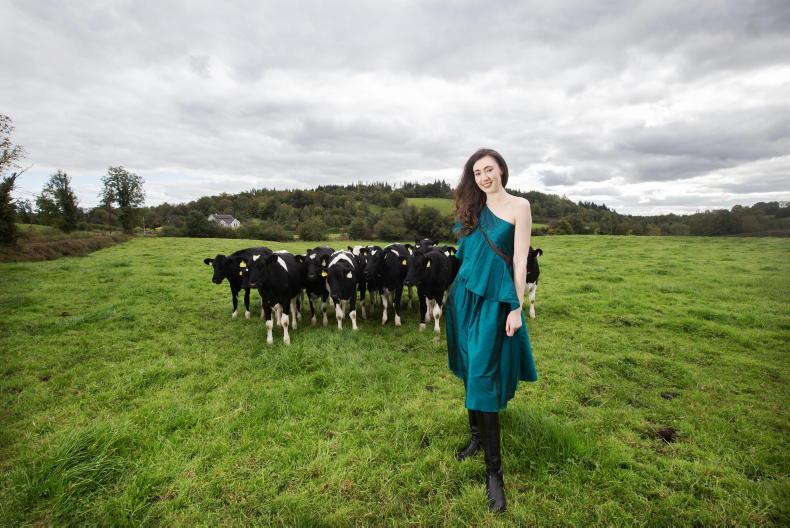
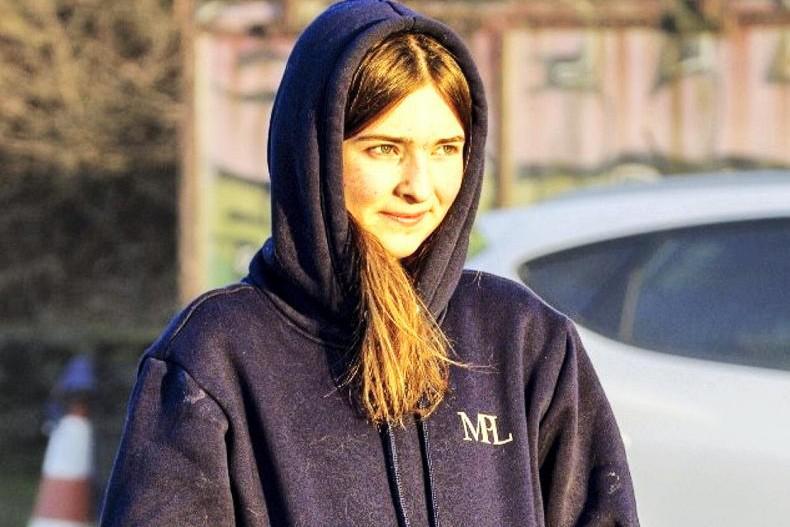
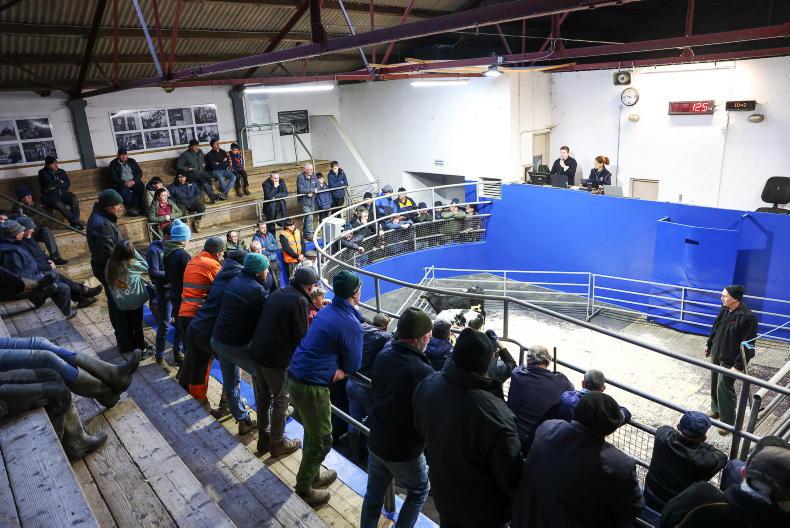
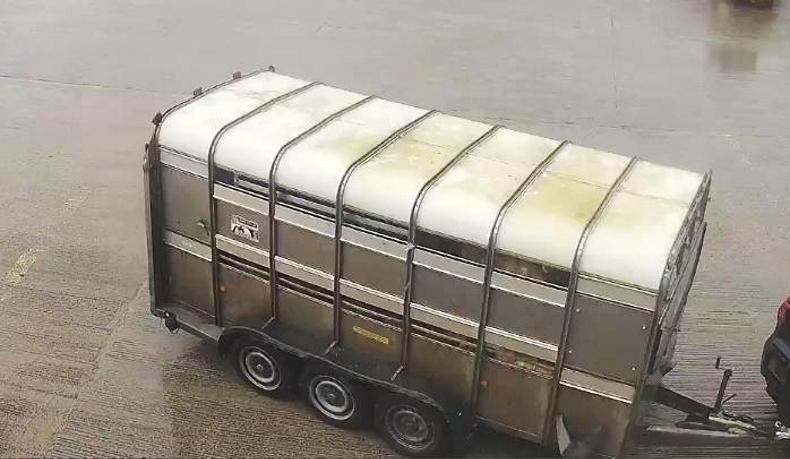
SHARING OPTIONS